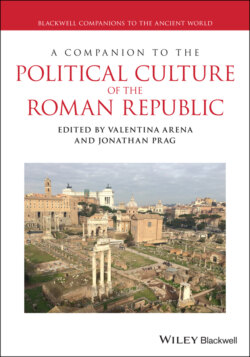Читать книгу A Companion to the Political Culture of the Roman Republic - Группа авторов - Страница 46
4.2 Roman Republican Ideas and French Education
ОглавлениеWhile this chapter is chiefly concerned with anti-monarchical uses of Roman references by eighteenth-century French writers, it is vital to realise that the Roman republican ideology had been made widely available by many authors who did not have the slightest intention of using it as a tool of political change against the Ancient Régime.2 The Traité des études (1736, 4 vols., 1st ed. 1726–1728) of Charles Rollin, the ‘pedagogical bible of the Ancient Régime’ (Nicolet 2000: 264), repeatedly refers to ancient Greek and Roman works as models of republican virtue and patriotism, without considering this as incompatible with the educational goal of forming faithful subjects of monarchy. In line with the purposes of the University, Rollin’s work aims at ‘educating the great men in the Republic of Letters’ (vol.1 A vr), that is to the ‘art of eloquence’ (A iiiv), but not without considering the moral and political objective of such an instruction: ‘making them virtuous…good citizens’ (Disc. Prelim. xx–xxi, i–ii). As to the Romans, however, Rollin (vol. 3, 555–571) devotes two quite long sections to two features of their ‘character’: their ‘hatred of kingship (royauté)’ and their ‘excessive love of freedom’ (see Chapter 28). These are also found, revealingly, in the Dictionary of Furetière (1727: vol. 4) at the entry ‘républicain’: ‘He that is in love with the freedom of his country; he who hates the monarchical government.’ As the Dictionnaire de l’Académie (1694: vol. 2, 398) points out, the term républicain ‘is sometimes taken pejoratively, and means mutinous (mutin), seditious, having sentiments opposed to the monarchical state in which he lives’. The fact that in Furetière’s Dictionary four paragons of Roman virtue are then mentioned as ‘great republicans’ – the two often conflated pairs of Brutuses and Catos – is indicative of the specific links between the republic, virtue and freedom encapsulated by the Roman Republic. First, virtue as the inaugural and founding expression of the love of freedom, that compelled Lucius Junius Brutus to drive out the Kings – note here that the agreed commonplace is that suppressing kingship meant recovering freedom (see Rollin 1736: vol. 3, 555). Second, virtue as the appeal to integrity of mores against the corruption of the republican order (Cato the Elder). Third, virtue as the love of freedom to the point of preferring to die rather than to live in servitude under Caesar: Cato the Younger, one of the ‘great men’ who ‘suckled, along with milk, the hatred of sovereigns and the love of freedom’, as he is presented in F.M-C. Deschamps’ Preface to his play Caton d’Utique (Deschamps 1715: 3; see Fabre 1991). Fourth, virtue as the courage to kill the tyrant: Marcus Junius Brutus, a ‘fierce republican’, as Caesar names him in Voltaire’s play The Death of Caesar (1741: 3.4, 52; see Abbé Lamare’s Avertissement to the play, ix; on the Roman reference in Voltaire, see Quastana 2006). It was a republican virtue in each case, the achievement of which was not envisaged as the supreme goal (cf. Pocock 2003: 518) but rather it was seen as a means to settle, maintain and recover freedom (see Skinner 2002: chapters 6–7; see also Chapter 2 in this volume). It is this thread that will be followed here.
